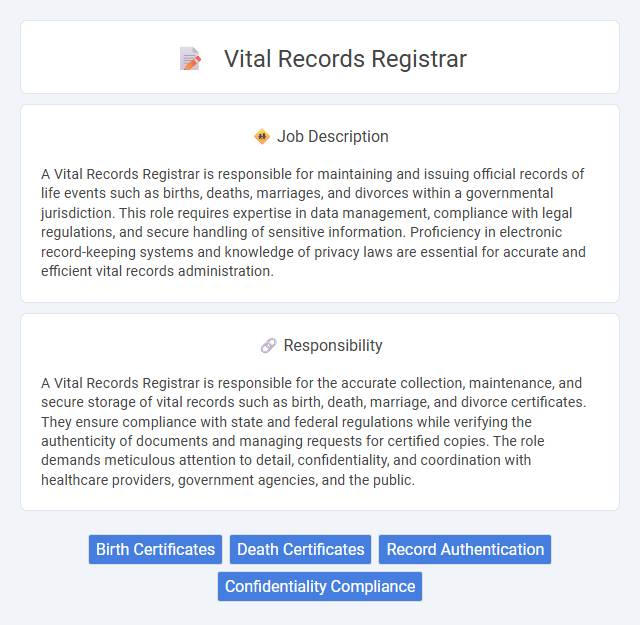
A Vital Records Registrar is responsible for maintaining and issuing official records of life events such as births, deaths, marriages, and divorces within a governmental jurisdiction. This role requires expertise in data management, compliance with legal regulations, and secure handling of sensitive information. Proficiency in electronic record-keeping systems and knowledge of privacy laws are essential for accurate and efficient vital records administration.
Individuals with strong attention to detail and organizational skills are likely suitable for the Vital Records Registrar role, as it involves managing sensitive documents such as birth, marriage, and death certificates. Those who prefer structured environments and have a high level of confidentiality awareness probably find this job fitting. Candidates struggling with accuracy or maintaining privacy may face difficulties in fulfilling the responsibilities effectively.
Qualification
A Vital Records Registrar must possess strong knowledge of state and federal regulations governing vital statistics, including birth, death, marriage, and divorce records. Proficiency in database management systems and exceptional attention to detail are essential for accurate record maintenance and retrieval. Typically, a bachelor's degree in public administration, health information management, or a related field, combined with experience in record-keeping or data management, is required for this position.
Responsibility
A Vital Records Registrar is responsible for the accurate collection, maintenance, and secure storage of vital records such as birth, death, marriage, and divorce certificates. They ensure compliance with state and federal regulations while verifying the authenticity of documents and managing requests for certified copies. The role demands meticulous attention to detail, confidentiality, and coordination with healthcare providers, government agencies, and the public.
Benefit
Working as a Vital Records Registrar likely offers benefits such as a stable salary, comprehensive health coverage, and pension plans, which may contribute to financial security. Employees might receive paid time off and opportunities for professional development, enhancing work-life balance and career growth. The role probably provides a supportive environment with job security due to the essential nature of vital records management.
Challenge
The role of a Vital Records Registrar likely involves managing sensitive and critical data, which presents ongoing challenges in ensuring accuracy and confidentiality. There is a high probability that the job requires navigating complex legal requirements and adapting to evolving regulations. Maintaining timely processing under pressure could frequently test problem-solving abilities and attention to detail.
Career Advancement
A Vital Records Registrar manages the accurate documentation and maintenance of essential life event records such as births, deaths, marriages, and divorces, ensuring compliance with legal and regulatory standards. Career advancement opportunities include moving into supervisory roles, such as Vital Records Supervisor or Department Manager, where one oversees larger teams and complex data management systems. Developing expertise in public administration, data privacy laws, and adopting advanced record-keeping technologies can lead to higher-level positions within government agencies or public health departments.
Key Terms
Birth Certificates
A Vital Records Registrar manages the issuance, amendment, and archival of birth certificates, ensuring the accuracy and security of these official documents. They maintain compliance with state and federal laws governing birth record documentation and facilitate public access while safeguarding sensitive personal information. Proficiency in recordkeeping systems and an understanding of vital statistics regulations are essential for efficient birth certificate processing.
Death Certificates
A Vital Records Registrar specializing in death certificates manages the accurate documentation and filing of death records in compliance with legal standards and health regulations. Key responsibilities include verifying the cause and date of death, ensuring the completeness of reports from hospitals and coroners, and maintaining secure, confidential records within government databases. Efficient handling of death certificates supports public health data accuracy and facilitates legal processes such as estate settlements and genealogical research.
Record Authentication
A Vital Records Registrar specializes in the authentication of essential documents such as birth certificates, marriage licenses, and death certificates, ensuring their accuracy and legitimacy. This role involves verifying official records against government databases and adhering to strict legal protocols to prevent fraud. Proficiency in state and federal record-keeping regulations is critical for maintaining the integrity of authenticated vital records.
Confidentiality Compliance
Vital Records Registrars ensure strict confidentiality compliance by safeguarding sensitive information such as birth, death, marriage, and divorce certificates. They implement secure data handling protocols and adhere to legal standards like HIPAA to protect personal records from unauthorized access. Maintaining privacy and accuracy in record keeping is essential to uphold public trust and meet regulatory requirements.
 kuljobs.com
kuljobs.com